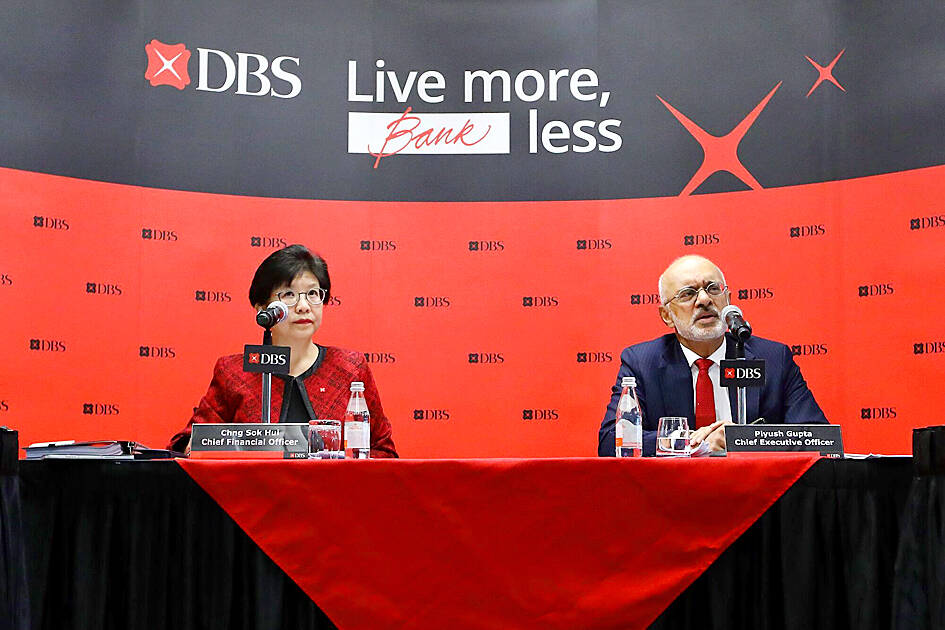DBS Group Holdings Ltd slashed chief executive officer Piyush Gupta’s compensation by S$4.1 million (US$3 million) after the lender suffered a series of digital banking outages last year and was reprimanded by the central bank.
The pay cut, announced on Wednesday alongside DBS earnings, represents a 30 percent reduction in variable pay for Gupta, one of the highest-paid executives in the country, who earned S$15.4 million in total in 2022. Last year’s outages that saw payment and ATM transactions stalled across the city-state also resulted in the variable compensation for the group management committee collectively cut by 21 percent from a year earlier.
“We’ve taken accountability,” Gupta said at an earnings briefing. “I think that’s a good element of governance.”

Photo: Bloomberg
The pay fallout came even though DBS’ full-year results hit a record. The bank’s net profit last year exceeded S$10 billion, a target it had set for itself for the medium term. It posted return on equity of 18 percent.
In the three months ended Dec. 31, net profit, excluding one-time items, rose 2 percent to S$2.39 billion, Singapore’s biggest lender said in a statement yesterday. This compares to the S$2.44 billion average estimate by analysts surveyed by Bloomberg News.
DBS also proposed a bonus share issue and raised its final dividend, saying it saw opportunities to return more to shareholders this year.
“The heavy punishing move highlights the management’s commitment to minimize future disruptions,” IG Asia Pte market analyst Yeap Jun Rong (葉俊榮) wrote in a note. Yeap added that DBS’ level of dividend yield towers above its peers.
In November last year, the Monetary Authority of Singapore banned DBS from acquiring new business ventures and reducing local branch and ATM networks for six months after a spate of digital banking service outages.
The actions followed repeated and prolonged disruptions of DBS’ online banking services last year, prompting Gupta to apologize to customers and assure them the bank is addressing the issues “with utmost priority.”
DBS said yesterday customers can expect greater service reliability, as well as alternative channels for payments and inquiries should issues happen.
Under Gupta’s leadership since November 2009, DBS has expanded operations in India, Taiwan and China through acquisitions and organic growth. He has also beefed up the bank’s wealth management business, which is now one of the largest in Asia in terms of assets under management.

When an apartment comes up for rent in Germany’s big cities, hundreds of prospective tenants often queue down the street to view it, but the acute shortage of affordable housing is getting scant attention ahead of today’s snap general election. “Housing is one of the main problems for people, but nobody talks about it, nobody takes it seriously,” said Andreas Ibel, president of Build Europe, an association representing housing developers. Migration and the sluggish economy top the list of voters’ concerns, but analysts say housing policy fails to break through as returns on investment take time to register, making the

‘SILVER LINING’: Although the news caused TSMC to fall on the local market, an analyst said that as tariffs are not set to go into effect until April, there is still time for negotiations US President Donald Trump on Tuesday said that he would likely impose tariffs on semiconductor, automobile and pharmaceutical imports of about 25 percent, with an announcement coming as soon as April 2 in a move that would represent a dramatic widening of the US leader’s trade war. “I probably will tell you that on April 2, but it’ll be in the neighborhood of 25 percent,” Trump told reporters at his Mar-a-Lago club when asked about his plan for auto tariffs. Asked about similar levies on pharmaceutical drugs and semiconductors, the president said that “it’ll be 25 percent and higher, and it’ll

CHIP BOOM: Revenue for the semiconductor industry is set to reach US$1 trillion by 2032, opening up opportunities for the chip pacakging and testing company, it said ASE Technology Holding Co (日月光投控), the world’s largest provider of outsourced semiconductor assembly and test (OSAT) services, yesterday launched a new advanced manufacturing facility in Penang, Malaysia, aiming to meet growing demand for emerging technologies such as generative artificial intelligence (AI) applications. The US$300 million facility is a critical step in expanding ASE’s global footprint, offering an alternative for customers from the US, Europe, Japan, South Korea and China to assemble and test chips outside of Taiwan amid efforts to diversify supply chains. The plant, the company’s fifth in Malaysia, is part of a strategic expansion plan that would more than triple

Taiwanese artificial intelligence (AI) server makers are expected to make major investments in Texas in May after US President Donald Trump’s first 100 days in office and amid his rising tariff threats, Taiwan Electrical and Electronic Manufacturers’ Association (TEEMA, 台灣電子電機公會) chairman Richard Lee (李詩欽) said yesterday. The association led a delegation of seven AI server manufacturers to Washington, as well as the US states of California, Texas and New Mexico, to discuss land and tax issues, as Taiwanese firms speed up their production plans in the US with many of them seeing Texas as their top option for investment, Lee said. The